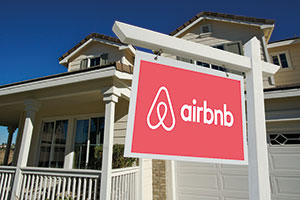
Officials are once again looking into the impact of Airbnb rentals and how possible regulations should be implemented.
By Henry Lin-David
A bill to tax and regulate short-term rentals like Airbnb hit a roadblock on Wednesday of last week after Gov. Charlie Baker returned the bill to lawmakers along with a proposed amendment.
While the original bill would require hosts to join a public registry, the governor’s amendment would eliminate their “personally identifiable information,” and would also exempt homeowners who rented units out for less than 14 days a year from the registry and the tax.
These short-term rentals are nothing new for Somerville, with many residents renting out rooms for extra income. The industry website Air DNA states that the city currently contains more than 700 active Airbnbs. However, some worry that this trend may negatively impact the community.
“There is a strong concern that the increase in short-term rentals is worsening Somerville’s housing affordability crisis,” says State Representative Christine Barber. According to Air DNA, more than 32% of Somerville’s active Airbnb units are “entire home” rentals. Some argue that these rentals are depleting the current housing stock and consequently causing rents to rise. At the very least, the situation requires more analysis.
“There is a need to have greater transparency about short-term rentals,” says Barber, “and also to address how these rentals impact our housing market.”
State Representative Denise Provost agrees, adding that short-term rentals are contributing to “forces of speculation, gentrification and displacement which are putting tremendous pressure on our communities.”
Somerville has attempted to impose laws on short-term rentals, but these efforts have been largely unsuccessful. “We have an ordinance that regulates ‘tourist homes’,” says Ward 5 Alderman Mark Niedergang. “I think maybe half a dozen people have registered. It hasn’t been enforced.” Although the guidelines prohibit the short-term rental of full units, Somerville contains more than 200 “entire home” Airbnb listings.
Currently, Airbnb requirements are primarily enforced through a complaint-based system, which is inherently inconsistent due to its reliance on community involvement. But Niedergang hopes that the statewide registry proposed by the bill could strengthen Somerville’s ordinances.
“It would set up a framework that would make it much easier for us to regulate short-term rentals effectively,” he says. In addition, Niedergang points out that the tax revenue would contribute towards covering the cost of regulation.
But regardless of their effects on housing, Airbnbs play a unique role in Somerville. “They’re certainly popular,” says Provost, who adds that they potentially can benefit both visitors and the community. Niedergang also sees value in offering “kind of an intermediate space between a regular big hotel and staying in your family’s homes,” as well as helping residents to pay off their rent.
With the Massachusetts House and Senate out of formal session, the bill’s progress will likely be halted until next year. Until then, Somerville will continue to wrestle with how best to deal with the rapidly-expanding market of short-term rentals.
“They should be regulated,” says Niedergang. “Stuff can happen … and people in the city government should know which properties are being rented out for health and safety.”












Reader Comments